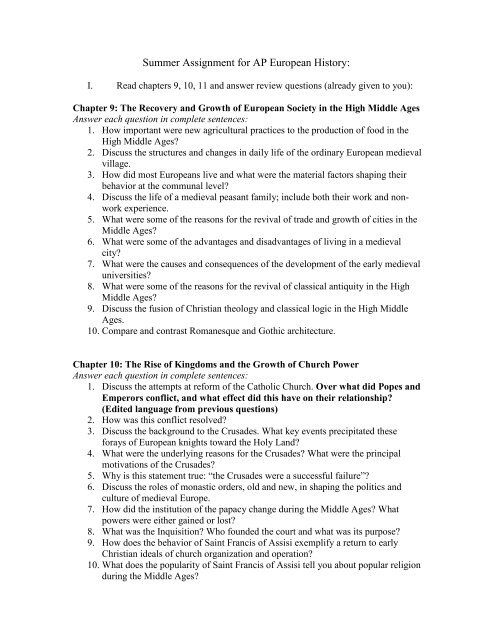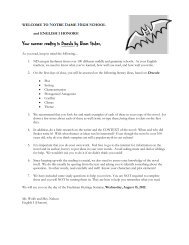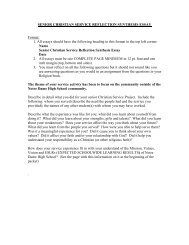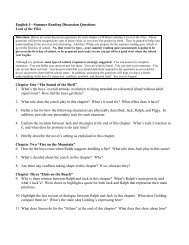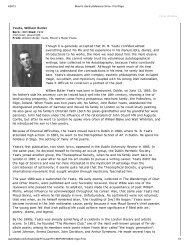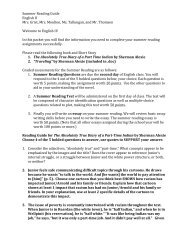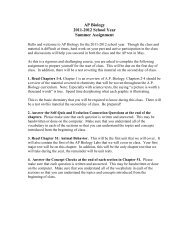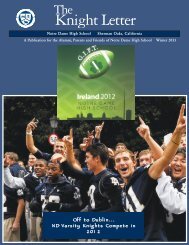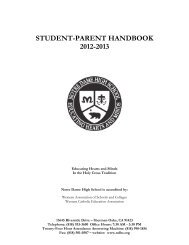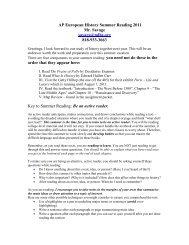Summer Assignment for AP European History:
Summer Assignment for AP European History:
Summer Assignment for AP European History:
You also want an ePaper? Increase the reach of your titles
YUMPU automatically turns print PDFs into web optimized ePapers that Google loves.
<strong>Summer</strong> <strong>Assignment</strong> <strong>for</strong> <strong>AP</strong> <strong>European</strong> <strong>History</strong>:<br />
I. Read chapters 9, 10, 11 and answer review questions (already given to you):<br />
Chapter 9: The Recovery and Growth of <strong>European</strong> Society in the High Middle Ages<br />
Answer each question in complete sentences:<br />
1. How important were new agricultural practices to the production of food in the<br />
High Middle Ages?<br />
2. Discuss the structures and changes in daily life of the ordinary <strong>European</strong> medieval<br />
village.<br />
3. How did most <strong>European</strong>s live and what were the material factors shaping their<br />
behavior at the communal level?<br />
4. Discuss the life of a medieval peasant family; include both their work and nonwork<br />
experience.<br />
5. What were some of the reasons <strong>for</strong> the revival of trade and growth of cities in the<br />
Middle Ages?<br />
6. What were some of the advantages and disadvantages of living in a medieval<br />
city?<br />
7. What were the causes and consequences of the development of the early medieval<br />
universities?<br />
8. What were some of the reasons <strong>for</strong> the revival of classical antiquity in the High<br />
Middle Ages?<br />
9. Discuss the fusion of Christian theology and classical logic in the High Middle<br />
Ages.<br />
10. Compare and contrast Romanesque and Gothic architecture.<br />
Chapter 10: The Rise of Kingdoms and the Growth of Church Power<br />
Answer each question in complete sentences:<br />
1. Discuss the attempts at re<strong>for</strong>m of the Catholic Church. Over what did Popes and<br />
Emperors conflict, and what effect did this have on their relationship?<br />
(Edited language from previous questions)<br />
2. How was this conflict resolved?<br />
3. Discuss the background to the Crusades. What key events precipitated these<br />
<strong>for</strong>ays of <strong>European</strong> knights toward the Holy Land?<br />
4. What were the underlying reasons <strong>for</strong> the Crusades? What were the principal<br />
motivations of the Crusades?<br />
5. Why is this statement true: “the Crusades were a successful failure”?<br />
6. Discuss the roles of monastic orders, old and new, in shaping the politics and<br />
culture of medieval Europe.<br />
7. How did the institution of the papacy change during the Middle Ages? What<br />
powers were either gained or lost?<br />
8. What was the Inquisition? Who founded the court and what was its purpose?<br />
9. How does the behavior of Saint Francis of Assisi exemplify a return to early<br />
Christian ideals of church organization and operation?<br />
10. What does the popularity of Saint Francis of Assisi tell you about popular religion<br />
during the Middle Ages?
Chapter 11: The Later Middle Ages: Crises and Disintegration in the 14 th Century<br />
Answer each question in complete sentences.<br />
1. Discuss the factors that led to the urban and rural revolts in the 14 th century.<br />
2. Was desperate poverty a chief cause of these revolts? Why or why not?<br />
3. What was the main cause of the 14 th century famines?<br />
4. What were the causes of the Hundred Years’ War?<br />
5. Why did the war continue on <strong>for</strong> so long during the 14 th century?<br />
6. What advantages did each side possess?<br />
7. What were the results of these wars on both France and England?<br />
8. What changes occurred in the political life of Italy during the 14 th century?<br />
9. What were the main causes of the Great Schism?<br />
10. What were the major results of this great political and religious conflict?<br />
11. What does the phrase ‘vernacular language’ mean?<br />
12. How did the adversities of the 14 th century affect both urban life and medical<br />
practices at the time?<br />
II.<br />
Geography<br />
a. See list of countries, cities and geographic features at end of this section<br />
b. Print out map and label it<br />
c. Expect a geography quiz when school begins<br />
III.<br />
Machiavelli’s The Prince<br />
A. Purchase a copy of the book. It is available in local book stores or can be<br />
purchased online.<br />
B. Background on Machiavelli<br />
For some background on Machiavelli, feel free to use the internet or an<br />
encyclopedia. It’s important to know the context (time, place, situations) in which<br />
he’s writing, in order to understand his purpose. The following sites give quick<br />
summaries of Machiavelli’s life:<br />
http://www.philosophypages.com/ph/macv.htm<br />
http://en.wikipedia.org/wiki/Machiavelli<br />
http://oregonstate.edu/instruct/phl302/philosophers/machaivelli.html
C. Read The Prince and prepare <strong>for</strong> discussion<br />
We will be having a discussion in class covering the following questions. Your<br />
assignment is to be prepared to fully participate in this discussion. In order to do<br />
this, please take notes from the book <strong>for</strong> each of the questions so as to be ready to<br />
discuss these questions in class.<br />
• You should have notes <strong>for</strong> each of the questions<br />
• Notes should include major points, ideas, and examples that help you<br />
answer the question AS WELL AS the chapter in your book in which you<br />
found the in<strong>for</strong>mation (so that we can examine the passage as a class).<br />
• Write in your book (underline, write in margins, etc.) so that you can<br />
easily find the sections to which your notes refer. This will allow you to<br />
easily find these sections during the discussion if necessary.<br />
• Your notes do not have to be in complete sentences and will not be graded<br />
<strong>for</strong> spelling, punctuation, neatness, etc.—they’re YOUR notes… simply<br />
make sure you can read and use them! I will be collecting your notes after<br />
the discussion to check <strong>for</strong> completion.<br />
• You may share ideas with a colleague, but simply copying a friend’s notes<br />
will be considered cheating and result in a zero.<br />
• Grades will be based on quality of notes and participation in the class<br />
discussion<br />
• Due date: first day of class<br />
• Your notes should be sufficient so that you can contribute an in<strong>for</strong>med<br />
opinion to the class discussion and back that opinion up with sufficient<br />
evidence from the text.<br />
Discussion Questions:<br />
1. What is Machiavelli’s view of human nature? In what passages is this stated most<br />
clearly? In your opinion, are his views of human nature accurate?<br />
2. Why does Machiavelli say that it is better <strong>for</strong> a prince "to be both loved and<br />
feared"? Is it possible <strong>for</strong> a prince to be both? Explain.<br />
3. In chapter 18, Machiavelli advices that a ruler ought to take both the lion and the<br />
fox as his models. What exactly does Machiavelli mean by this advice? How does<br />
it fit into the argument of Chapter 18, and how does it influence our overall<br />
understanding of The Prince?<br />
4. Does Machiavelli believe that ethical considerations have a role to play in the<br />
conduct of a prince? Explain.<br />
5. Does The Prince present justice as nothing more than the interest of the stronger?<br />
Explain.<br />
6. Why did Machiavelli write The Prince?
Be able to locate the following on the <strong>European</strong> map. More important than knowing<br />
where cities are is knowing in what country they are located… so make sure you know,<br />
<strong>for</strong> example, that Prague is the capital of the Czech Republic.<br />
Countries & Major Cities:<br />
Portugal<br />
Lisbon<br />
Spain<br />
Madrid<br />
Barcelona<br />
France<br />
Paris<br />
Vichy<br />
Avignon<br />
Luxembourg<br />
Belgium<br />
Brussels<br />
Netherlands<br />
The Hague<br />
Amsterdam<br />
Rotterdam<br />
United Kingdom:<br />
England<br />
London<br />
Manchester<br />
Scotland<br />
Edinburgh<br />
Wales<br />
Northern Ireland<br />
Belfast<br />
Ireland<br />
Dublin<br />
Germany<br />
Frankfurt<br />
Berlin<br />
Munich<br />
Dresden<br />
Bonn<br />
Austria<br />
Vienna<br />
Switzerland<br />
Zurich<br />
Geneva<br />
Bern<br />
Italy<br />
Rome<br />
Venice<br />
Florence<br />
Naples<br />
Milan<br />
Turin<br />
Slovenia<br />
Countries & Major Cities:<br />
Czech Republic<br />
Prague<br />
Slovakia<br />
Bratislava<br />
Poland<br />
Warsaw<br />
Krakow<br />
Gdansk<br />
Lithuania<br />
Latvia<br />
Estonia<br />
Hungary<br />
Budapest<br />
Croatia<br />
Zagreb<br />
Serbia<br />
Belgrade<br />
Montenegro<br />
Bosnia-Herzegovina<br />
Sarajevo<br />
Albania<br />
Former Yugoslav Republic of Macedonia<br />
Greece<br />
Athens<br />
Turkey<br />
Istanbul (Constantinople)<br />
Bulgaria<br />
Sofia<br />
Romania<br />
Bucharest<br />
Moldova<br />
Ukraine<br />
Kiev<br />
Belarus<br />
Russian Federation<br />
Kaliningrad<br />
Moscow<br />
St. Petersburg/Leningrad<br />
Volgograd (Stalingrad)<br />
Finland<br />
Helsinki<br />
Sweden<br />
Stockholm<br />
Norway<br />
Oslo<br />
Denmark<br />
Copenhagen<br />
Bodies of Water:<br />
Baltic Sea<br />
North Sea<br />
English Channel<br />
Bay of Biscay<br />
Strait of Gibraltar<br />
Mediterranean Sea<br />
Aegean Sea<br />
Strait of the Dardanelles<br />
Strait of the Bosphorus<br />
Black Sea<br />
Caspian Sea<br />
Adriatic Sea<br />
Ionian Sea<br />
Rivers:<br />
Po Elbe<br />
Tiber Oder<br />
Ebro Danube<br />
Loire Volga<br />
Seine Rhone<br />
Rhine Thames<br />
Mountains:<br />
Pyranees<br />
Apennines<br />
Alps<br />
Caucasus<br />
Carpathians<br />
Urals<br />
Balkans<br />
Islands:<br />
Crete<br />
Sicily<br />
Sardinia<br />
Corsica<br />
Other Landmarks:<br />
Brittany Peninsula<br />
Crimea<br />
Iberian Peninsula<br />
Balkan Peninsula<br />
Silesia<br />
Alsace/Lorraine<br />
Ruhr Valley
Note: Montenegro became independent from Serbia-Montenegro in 2006. Its independence is not<br />
reflected in this map. Also, label “Kosovo” on this map. The US recognizes Kosovo as an<br />
independent country; others, such as Serbia, Spain and Russia, do not.<br />
Modern-day Europe Map


